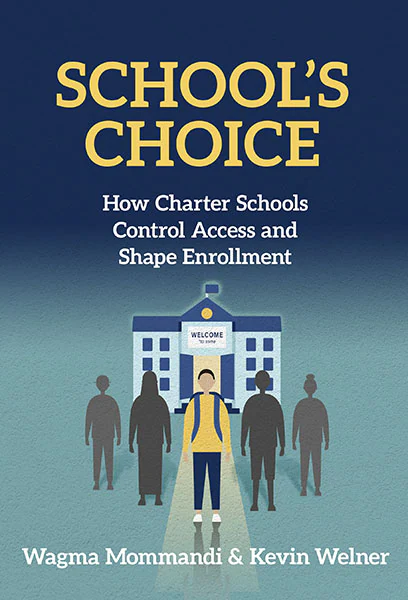Answer Sheet: Book Excerpt: How Charter Schools Control Access

The following is an excerpt from “School’s Choice: How Charter Schools Shape Access and Control Enrollment,” a new book authored by Wagma Mommandi and Kevin Welner. The book describes 13 ways that the decisions of charter school operators shape who is enrolled in their schools.
Mommandi and Welner explain that some of these decisions are made before a parent applies to a charter school — such as decisions about how to advertise the school. Other decisions are made after a student is enrolled — such as choices about the excessive use of discipline approaches that push out students.
Finally, five of the 13 categories describe practices used during the application process. Chapter 8, which is excerpted below, explains one of these: “Send us your best: Conditions placed on enrollment.”
You can read an accompanying piece to this here.
Note that the excerpt is condensed considerably, including the removal of citations or the use of hyperlinks in lieu of citations.
THE EXCERPT:
When charter schools place conditions on enrollment, these conditions often overlap with a broader set of exclusionary policies and practices. … A school that discourages enrollment by students with more severe disabilities, for example, might communicate this message through online program descriptions and through their applications, and then through expressly stated enrollment requirements. …
Many high-profile operators of charter schools have extended school days and years. KIPP schools, for example, routinely add 3–4 hours to the day and a few weeks to the year (e.g., via mandatory Saturdays and/or summer school). Although such extended days and more time in school are well intended and often beneficial and welcomed features of charter schools, they can effectively reduce access and become burdensome requirements for parents.
In a 2016 op-ed, parent Deborah Bennett identified these increased hours as a reason she chose to take her child out of Massachusetts’s Conservatory Lab Charter School. She explained, “Our children put in marathon days, with only one break for recess in the middle. This kind of structure is not only harmful to students’ physical and emotional well-being, it also runs contrary to recent research, which suggests that learners need physical breaks to promote academic achievement.”.
Sometimes, this extended time is evident across a district’s entire charter sector. In 2008, for instance, the New York City charter school sector as a whole offered an average of 30% more school time than the city’s regular public schools. …
An interviewee told us about two charter schools in Cleveland that screen students who might be disciplinary burdens. A 2015 report from the Delaware General Assembly corroborated that the Ohio Virtual Academy has an enrollment procedure that asks for information, including psychological reports, custody documentation, disciplinary records, and any weapons violations. Meanwhile, Stockyard Community Elementary will not enroll any student who is currently under suspension or expulsion from any other school or district. Further, Stockyard asks parents about IEPs and behavior modification plans. (The application also requests a birth certificate.) Five states (Arizona, Illinois, New Hampshire, New York, and Texas) have charter laws with specific language that allows charter schools to deny admission to students who have been expelled or are in the process of being expelled or who have a criminal offense, according to a 2015 report published by the Delaware General Assembly. But just asking in applications about disciplinary history—rather than outright denial of admissions—can have the intended effect. As stressed by one of our attorney interviewees, this practice of asking students for a disciplinary or criminal record as part of the enrollment process has a large influence over who decides to enroll in a charter school.
Interestingly, even in those five states with permissive language about denial of admission, charter schools may be overreaching. In 2014, Harmony Public Schools, a Texas-based charter management organization with 54 campuses, was subject to a compliance review by the U.S. Department of Education’s Office for Civil Rights (OCR) that found students with disabilities and emergent bilinguals were significantly underrepresented. As set forth in the letter from OCR to Harmony … , although Texas state law provides that charter schools may exclude such students, OCR remained concerned that these practices may illegally have the effect of discriminating against students with disabilities and ELL students.
In Arizona, the law is slightly different. Charter schools may refuse to enroll students who are in the process of or have been expelled from another school, but they cannot deny students who have been or are in the process of being suspended. Yet the ACLU of Arizona found that 39 of the state’s charter schools either refused to admit students with prior suspensions or implied that prior suspensions could affect admissions. In addition, the ACLU found that charters requesting disciplinary records often did not make it clear that the documentation would not affect a student’s enrollment eligibility. This practice, the ACLU concluded, may suppress the enrollment of some students and send them a message that they are not welcome. …
Charter schools sometimes deny enrollment to students who fail to demonstrate high enough academic performance or who do not have high grades and test scores from previous years.
Simon (2013) noted a charter high school in California that “will not consider applicants with less than a 2.0 grade point average. Another will only admit students who passed Algebra I in middle school with a grade of B or better.” She also pointed to states that allow charter schools to give admissions preferences to students who express interest in a school’s theme or focus: “Some schools use that leeway to screen for students who are ready for advanced math classes or have stellar standardized test scores.”
One of our interviewees shared that in addition to requiring that applications include copies of students’ IEPs and birth certificates, Benjamin Franklin High School in New Orleans requires students to take an admissions test in reading, language, and math to avoid students whose test scores (combined with prior GPAs) are insufficient.
[T]his practice of explicitly screening applicants by academic performance is allowed in Florida, Louisiana, New Hampshire, Ohio, and Texas. [S]even states that appear to allow charter schools to include a preference for demonstrated interest or academic performance: again Florida, Louisiana, New Hampshire, and Texas, as well as Delaware, Pennsylvania, and Wyoming.
These sorts of preferences allow charter schools to select their desired students during the enrollment phase, by prioritizing seats for students with high academic potential. Some approaches include an academic preference in a lottery, some use prior academic achievement as a condition of enrollment, some require a demonstration as part of the application process, and some require students to have a demonstrated interest in the focus of the school. Supporters of these strategies contend that it is important for schools and students to match interests. This can ensure, for example, that a school focused on the arts identifies students with the talent and passion for art. The resulting barriers to entry, however, create elite schools that systematically exclude students who are less advantaged.
A [2016] report by the ACLU of Southern California and Public Advocates identifies 22 California charter schools that discriminate based on academic performance. For example, to apply as a sophomore to Western Center Academy in Riverside County, “Students must be earning an ‘A’ or ‘B’ in both Geometry and Biology,” and “students must have an overall 3.0 or higher GPA with no failing grades.” The school further “[r]equires 3.0 minimum G.P.A. without failing grades for 9th grade applicants, and ‘A’ or ‘B’ grades in Geometry (along with the 3.0 G.P.A. without failing grades) for 10–12th grade applicants”.
Similarly, [the 2017] report by the ACLU of Arizona found that although most charter schools in Arizona appear to accept all students, many schools still signaled that low achievers might not be welcome. Close to half of charter schools analyzed in the report request academic records as part of the enrollment process and do not make it clear that those records will only be used for post-enrollment placement. The report also notes how a placement exam required by Heritage Academy Gateway was apparently used in order to effectively deny admission:
A parent filed a complaint with the Arizona State Board for Charter Schools in June 2016. The parent tried to enroll her daughter, who was entering 7th grade, for the 2016–17 school year. The school required her to take a placement test as part of the enrollment process. A few days after her daughter completed the placement test, the parent said she received a call from the school’s registrar. “She called to let me know that the school wouldn’t be a good fit for [my daughter] because she didn’t score high enough,” the parent wrote in her complaint. She said she asked if her daughter could participate in an organization and leadership class that the school offered to help students with the need for additional instruction. She said the registrar told her the class was only for students with an Individualized Education Program (IEP). The parent then asked if she could set up a meeting with the school to create an IEP for her daughter. The registrar, however, declined “and again said that she didn’t think the school was going to be a good fit,” according to the complaint.
…
Among the most common admissions preferences given by charter schools are those for siblings of current students, plus children of staff members and of the schools’ founders. But this can be problematic, particularly for smaller, in-demand charters. … [A]fter these preferred applicants are admitted, schools can become virtually inaccessible to other families. Yet these preferences are very common. …
In Philadelphia, a 2015 audit of Infinity Charter School in Penbrook revealed a policy that gave preferential enrollment to children and grandchildren of its employees and board members. Infinity, a consistently top-performing charter school in the state, focuses on teaching gifted students and has had a waiting list of students wanting to gain admission since the school opened in 2003. The Pennsylvania auditor general concluded that this grandchildren policy created an unfair advantage to those students, which violated the intent of the state’s charter school law.
In contrast, Arizona’s charter school law clearly allows this, as well as … [preferences for grandchildren and for pupils who attended another charter school and even to the siblings of those pupils if the other charter school is run by the same Charter Management Organization]. …
[P]references for siblings and children for staff and founders … has a predictable effect of eluding outsiders. As explained by an Idaho teacher discussing preferences in that state, when a charter school’s parents, board members, teachers, and existing student body are already affluent and White, preferences will ensure that the newest groups of students will continue to be so as well. ...
In Georgia, charter enrollment guidelines allow a school to give priority to a group of students who are matriculating from another school. Taking advantage of that provision, Savannah Classical Academy gave priority to middle school graduates of another charter …, effectively squeezing out the many other applicants for high school slots on the charter’s long wait list. …
For families in neighborhood public schools, enrollment is usually a simple process. But enrollment practices in decentralized, choice-based systems can be byzantine, particularly if the system has only minimal oversight. Enrollment preferences can strategically select high achievers and can deny enrollment to students with disciplinary histories. In schools with extended school days and years, required agreement to those terms can also significantly shape access. …
This blog post has been shared by permission from the author.
Readers wishing to comment on the content are encouraged to do so via the link to the original post.
Find the original post here:
The views expressed by the blogger are not necessarily those of NEPC.


